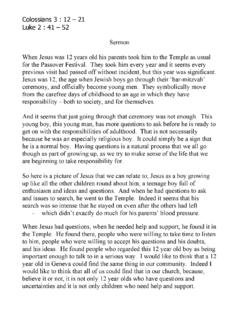Transcription of 2 Corinthians 6 : 1 - 13 Sermon - Church of Scotland …
1 2 corinthians 6 : 1 - 13 SermonI m going to let you into a little secret this morning, something which you might find difficult to believe. It is this startling fact - just occasionally, preachers worry that no one is actually listening to anything they ridiculous is that? But if there is any truth in it at all, it could be perhaps because what they are going to say can be so predictable that listening doesn t seem like the most worthwhile way to use the time. If we know pretty much what the preacher is going to say, we can use our mental energy to plan the afternoon s activities, or to sort out our priorities for the week ahead. After all the message of the gospel has been proclaimed and shared, written and talked about, for rather a long time now.
2 What can there be to say about it that could be new?So just occasionally, ridiculous though it is preachers worry that no one is actually listening to anything they say. And sometimes we are pushed to come out with something a little bit provocative, a little but shocking just to see if anyone notices. I think today might be one of those my Sermon this morning I am going to urge you not to accept the grace of God. Now for those who were listening, and just before you prepare your letters and emails to question my theology, let me assure you that I am simply following the teachings of scripture. In our text this morning, we find that Paul himself has written the words we urge you also not to accept the grace of why would he say that?
3 Surely we all need a bit of grace of in lives. Indeed some of us need a lot of grace in our lives. And if we are looking for grace then the grace of God is surely the very best kind that we are ever going to be offered. Grace is the word which we use to describe the way he accepts us even though he knows exactly what we like. It describes the way he forgives us and heals us and renews us, even though we don t deserve any of that, and perhaps especially when we recognise that we don t deserve any of that. So why would Paul urge us not to accept the grace of God, and why would I pass on the message. 2 corinthians 6 : 1 - 13 Well of course I am being a little bit scandalous, a little bit provocative.
4 For our text has two more words before it reaches the full stop; two more words which are very significant. What is written is, we urge you also not to accept the grace of God in vain. Now that changes the sense completely. It is not that we are urged not to accept the grace of God, but that we are urged to do more than merely accept something can be fairly easy to do. If someone offers us a gift we are generally very willing to accept it. Sometimes that happens at formal occasions where someone has given a little speech and as a token of appreciation they will be handed something which is nicely wrapped. When you receive a gift like that you will often have no idea what the parcel might contain, other than a fairly certain expectation that it will not be anything too have quite a few ties in my drawer with the crests of organisations which I have been connected with over the years, and as you may gather I am not one of the worlds great tie wearers!
5 But none of that comes in to the equation when I have to decide what to do. Of course I accept the gift and I express gratitude and everyone is happy. What else would I do? Accepting it is only what is expected, it is only polite, it is only right. But perhaps that picture of accepting something has some resonance for the way we think of this thing which we call the grace of God. We may hear from a young age about how wonderful it is, and we are never asked to do very much in order to get it. Indeed one of the few things we know is that we can never do anything to earn it. So when it is offered to us why would we not accept it? We say yes and in our minds and perhaps with our words, we go along with the idea and everyone seems to be happy.
6 We say yes to the gift without any real intention or expectation that we will ever do much with if that attitude is present in us then it seems we are not the first because even in his time, even when the faith seemed so strong and urgent and vibrant, Paul had to write to the believers in Corinth and say; we urge 2 corinthians 6 : 1 - 13you not to accept the grace of God in vain. He was urging them, and I am urging us, not to accept the grace of God and do nothing with it,not to accept the grace of God and then block its power to do its work in our you imagine if one of those formal gift giving moments actually turned out to be different from normal. Can you imaging that the gift being handed over actually contained, not a tie, but something of real value and significance.
7 And can you imagine the frustration felt by the giver if the recipient merely accepts what is given and lays is aside without ever bothering with it without ever using it or appreciating it. The grace of God is not given as a token, or a symbol, or a kind gesture. It is not something for us to add to our list of things we have received. It is given to us for a purpose. It is given to us allow us to leave behind all the murky, regrettable, shady stuff from our past, with the expressed purpose that we might then participate in all of the glorious things which Paul has been writing about. It is given to allow us to discover a whole host of other gifts; things like purity, knowledge, patience, kindness, holiness of spirit, genuine love, truthful speech, and the power of we are going to accept the grace of God in our lives then we should not accept it in vain, rather we should expect it to make a difference, and we should let it make a difference.
8 If you went to see the doctor because you knew something was wrong with way your body was functioning, you might be quite pleased if he or she gave you a bottle of medicine. But if you take the bottle home and keep it untouched on the shelf; it doesn t matter how pleased you might be, the medicine is not going to do to much good. You will have received it, but it will have been given in you turn towards God because you know that something is wrong in your life, you might be rather delighted to discover that he offers you such wonderful grace. But if you then just carry on as before, if you continue to charge through life chasing your every whim it doesn t matter how pleased you might feel, the problems are going to recur.
9 You will have received it, but you will have received it in vain. The dictionary tells us that the phrase in vain means not achieving the desired outcome, fruitless . How 2 corinthians 6 : 1 - 13wonderful it is that such a wonderful gift is offered to us by a loving God, and how tragic it is if we do not allow it to achieve its desired outcome in our lives, if it remains was passionate about this because for him and those who travelled with him, the grace of God was not just a piece of doctrine. For them this grace was something they needed to cope with the batterings they were taking each day; batterings which were physical and emotional and spiritual, batterings to their bodies and their feelings and their faith.
10 He writes about their experiences as servants of God as something which has brought then through great endurance, in afflictions, hardships, calamities, beatings, imprisonments, riots, labors, sleepless nights, hunger . In circumstances like that I m sure they must have made many mistakes. I m sure they must have spent many nights wondering if God was really around or if he could really be trusted. I m sure they must have said and done things they later regretted. I m sure that they needed to receive the grace of God just to keep going. Which is why he must have been so frustrated with people taking it casually, saying their prayers and singing their hymns, asking for God s grace and expressing thanks for God s grace, but continuing to live their lives in the same way as before,continuing to live as if nothing was he does not simply urge people simply to receive this grace, he urges them to let this grace do its work in their lives; to cleanse them and to renew them and to revive them and to set them on a new course.












